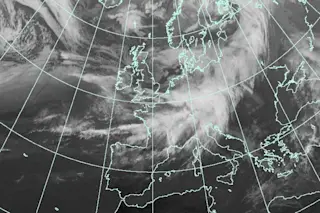This headline from Reuters is really unbelievable: " Hurricane sweeps across Europe." WTF? The first sentence of the article is even worse: "Germans were told to stay indoors and many schools across the country closed early on Thursday as a rare hurricane bore down on the country, cutting air traffic at its biggest airport by half." The only tropical storm on record to strike any part of Europe was Vince of 2005 (PDF), and it weakly passed over the Iberian peninsula as a tropical depression. I don't even have to check the weather to tell you that what Germany and much of the rest of Europe is currently experiencing is an extratropical cyclone, or winter storm, not a hurricane. I did check it, though, and you can see from the satellite image above (courtesy of the UK Met Office) that there ain't no hurricane over Europe. Saying that Germany has ...
Massive Cyclone Confusion Strikes Europe
A hurricane sweeps across Europe, but experts clarify it's an extratropical cyclone, not a tropical storm on record. Discover more!
More on Discover
Stay Curious
SubscribeTo The Magazine
Save up to 40% off the cover price when you subscribe to Discover magazine.
Subscribe













